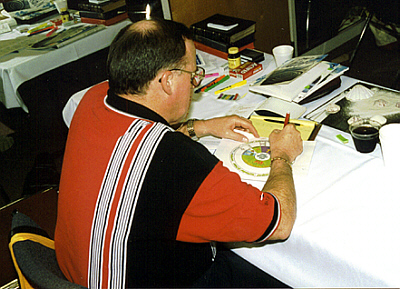General Board of Global Ministries
![]()
UM Information
UM
Reporter
![]()
Florida Southern College
![]()
Bethune
Cookman College
![]()
FL UM Children's Home
![]()
|
|
‘New’ process helps congregations make disciples |
|
Photo by Michael Wach |
The Rev. Gordon Turner, senior pastor of St. Andrew's-Wesley United Church in Vancouver, Canada, writes notes about the Christian initiation process on a church calendar. Although the complete process of helping someone move from seeker to disciple can sometimes take several years, many of the key worship experiences involved in the process are tied to specific dates or seasons. |
| By Michael Wacht BRADENTON — "I don’t think we’re reaching people who are asking deep, searching questions," said the Rev. Dan Benedict. "That usually happens with a pastor, but the congregation as a whole doesn’t get involved." Benedict is worship resources director for the General Board of Discipleship and taught the "Making Disciples for the New Millennium" workshop Nov. 3-6 in Bradenton. The training event was coordinated by the conference’s Spiritual Formation office to help church members learn how to make disciples for Jesus Christ and introduce them to the process of Christian initiation. "Christian initiation is the process of reaching seekers and making disciples based on the ancient church’s way of making Christians in the third and fourth centuries," Benedict said. "The emphasis is on grounding discipleship in the baptismal covenant. It’s designed to be a congregational process with the whole congregation offering hospitality and praying for and knowing the seeker." Christian initiation, according to Benedict, is a four-step process designed to lead seekers through a process of growth and development. "The focus is on grounding persons who are on a search on the very basic disciplines of Christian life," he said. Each step culminates in a worship experience that celebrates the step and allows seekers to publicly declare their intentions. It also allows the congregation to respond to the declaration with support. In the first step, seekers are befriended by sponsors or mentors who get to know seekers, listen to their stories and answer their questions, Benedict said. Then, the seeker is ready to make a more "substantive investigation of the Christian faith," he said. That investigation takes the form of weekly meetings in which a group of seekers and their mentors meet and "reflect on their lives and scripture," Benedict said. The scripture used for the reflection is usually the Bible passages used in Sunday’s worship service. Once seekers decide they want to become part of the church family, they declare their intention to become baptized members during a special worship service. It is similar to a church process used in the first centuries during which new believers showed they had repented, then entered a time of prayer and fasting, according to Benedict. This step normally takes place at the beginning of Lent or Advent, preparing for baptism on Easter or Christmas. Once seekers have been baptized, they begin becoming fully integrated into the community. The mentor and congregation help seekers identify and understand their spiritual gifts, and the seekers begin entering the church’s ministry. "This process is not intended to be an obstacle course to hinder people or slow them down," Benedict said. "It is designed to offer the fullness of Christian hospitality for people who are seeking." He said the United Methodist Church has gotten away from its evangelical roots, and is focused more on making members than making disciples. "Many church practices…are aimed at orienting new members at programs and activities," he said, adding churches are looking for people who can bring money, time and talents that will help keep the church from closing. "We are living as watched persons in a skeptical society," he said. "We need to get away from vampire evangelism: getting more members to suck the life out of them. That is a process motivated by fear. This is precisely the wrong time to be motivated by fear." Top
of this page |

